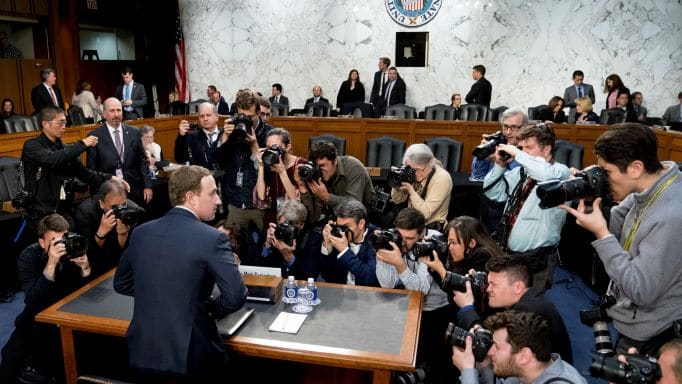Many experts think tech giants have grown too powerful. But they disagree over how best to regulate emerging technology without stifling innovation.

Facebook CEO Mark Zuckerberg at an antitrust hearing before the U.S. Congress in Washington, DC, 10 April 2018 (AP Photo/Andrew Harnik)
In many ways, our lives are dominated by large corporations.
Our internet provider is often a local monopolist. We buy via Amazon. We use Google every day. We are fed via multinational delivery chains, and we buy everything from tennis shoes to technological gadgets from well-known, super-large international brands that are dominant in their industries.
Some sing the praises of small, mom-and-pop shops. But while a large number of little stores are forced to close, large corporations thrive. During the COVID-19 pandemic, many have increased their profits and market share, becoming larger and more powerful.
Are large corporations bad? They often provide the best product or service for the lowest possible price, with the quickest delivery time. What could be wrong with them?
First “antitrust” laws curbed excessive corporate power.
There was a time in the United States when being big was considered suspect. There was a curse of bigness. At the end of the 19th century, laws were passed to curtail excessive corporate power. They were called “antitrust” laws, named after a particular type of monopoly called “trusts.”
The notion was that excessive power wielded by a single firm was bad for the market because it reduced competition, pushed up consumer prices and limited job opportunities and pay increases for workers.
Congress passed the Sherman Antitrust Act in 1890, prescribing free commerce, but it took more than 20 years before the U.S. Supreme Court declared Standard Oil Company of New Jersey, a company controlling 90% of the market in which it was operating, an illegal monopoly.
The company was ordered to break up into 34 independent companies. Standard Oil of New Jersey became Exxon, and Standard Oil of New York became Mobil.
Large firms have increased their market share.
Fast forward to today, and many large corporations have significantly increased their market share over the past 15 years.
According to the Economist magazine, market concentration in the United States, Great Britain and the European Union has increased over the last two decades. Attitudes towards large tech conglomerates have evolved in almost all large countries.
In China, authorities have moved against large corporations. The Bank of China forced two tech giants — Tencent and Alibaba — to drop exclusive payment systems. The National Press and Publication Administration has forbidden children to play video games for more than three hours per day.
The EU, which fined Microsoft in 2004 for anti-competitive practices, has stepped up its investigations of Google, Amazon and other tech giants, in some cases levying fines. Some defenders of the U.S. firms have accused Brussels of protectionism.
Some think technology firms require a different type of antitrust regulation.
But while many experts say more effective antitrust action is needed, the digital economy seems to demand different rules to keep competition alive. The biggest technological companies are more difficult to understand and regulate than more traditional industries.
The U.S. Congress is considering several antitrust bills, but economists and lawyers disagree on what needs to be reformed, how and when.
Luis Cabral, an Economics professor at New York University and an expert in antitrust regulatory issues, says existing rules need to be amended.
“Yes, the need for antitrust action is greater,” he said. “In many sectors, we do observe an increase in market power at a rate that we have not observed in the past. However, I would say that more than a demand for more antitrust, there is a demand for a different type of antitrust. Because the key industries with market power are different from more traditional industries.”
According to Cabral, the digital economy should be regulated in different ways for three reasons:
- the companies’ business models are often peculiar;
- data – often tech giants’ main asset — is difficult to evaluate;
- mergers — the traditional way for companies to gain unfair market share in the past — play an important role in stimulating innovation.
Sometimes you may not know you’re paying a higher price.
“One of the aspects that distinguishes modern industries in the digital space from traditional ones is that frequently they are characterized by two-sided markets or two-sided platforms,” he says.
An example of a two-sided market platform? Credit cards. Credit cards are often free of charge for consumers, who pay no fee and often get points or miles or discounts. Their price seems to be negative, and they make revenues charging commissions to retailers instead. The hidden result is that eventually credit card fees push up the prices of consumer goods.
Similarly, Google does not charge users but then leverages users’ data to place advertisements. The price of some goods, for example a pair of Nike shoes, can be higher because of the ads paid by Nike to Google. In other words, consumers end up paying Google through the higher cost of the running shoes.
“You have to be very careful about deciding whether or not consumers are paying a price,” Cabral said. “Frequently, they do not pay a price directly, but they do pay a price and sometimes a high price indirectly.”
The point is relevant because traditionally antitrust action focused on companies that used their market power to push up consumer prices directly.
Is focusing on prices enough?
Lina Khan, the 32-year-old chair of the U.S. Federal Trade Commission, made her name with an influential essay entitled, “Amazon’s Antitrust Paradox.” She argued that traditional antitrust principles that focus on keeping a lid on consumer prices cannot apply to platforms like Amazon. Amazon keeps prices low and widens the array of product offering but still stifles competition because of its size and the way it operates, she wrote. Kahn is expected to oppose the $8.5 billion acquisition of MGM Studios by Amazon.
While some have saluted Khan’s approach as the boldest in a generation, others disagree with her.
Some economists say that authorities should become more vigilant in doing what antitrust traditionally does – blocking deals that push up prices paid directly by consumers.
Larry White, another Economics professor at New York University, is not sympathetic with Khan’s approach. “They will end up weakening antitrust rather than strengthening it,” he said, calling for tougher enforcement to stop mergers.
“The whole point is to stop mergers that are going to cause higher prices,” White said. “The antitrust enforcement people, the U.S. Department of Justice, antitrust division, the U.S. Federal Trade Commission, allowed too many of those mergers over the last 10 or 20 years to go through.”
White said that agreements among employers should be blocked, and antitrust agencies should be given larger budgets.
‘We run the risk of killing the goose that lays the golden eggs.’
Traditionally, antitrust authorities have resorted to blocking mergers that increased market concentration. But in the tech industry, the acquisition of smaller companies by giant groups can often lead to more research and innovation.
According to Cabral, since 2000 the five largest tech companies in the United States have acquired more than 1,000 companies – many of them relatively unknown to the public.
“You probably heard about Facebook acquiring Instagram and WhatsApp, you probably heard about three or four more, but then there’s about 990 companies that you never heard about,” Cabral said, citing Google’s purchase of Idealab, which he said was not anti-competitive and which he said allowed Google to improve the quality of their ad services.
Cabral said that in some cases, acquisitions that have been approved can be reversed. He cited Facebook’s purchase of WhatsApp and Instagram. “Now that we know that the acquisition of WhatsApp and Instagram probably had or likely had an anti-competitive effect, we could and probably should seriously consider the possibility of forcing them to divest.”
But he said regulators have to be careful. “If we implement a very restrictive policy of acquisitions, we seriously run the risk of killing the goose that lays the golden eggs, because the process of acquisition is part and parcel of the process of value creation in this space. So that’s one reason why I think we should be extra careful,” he said.
“The nature of the business model in this sector is so poorly defined, many times firms don’t have a very clear idea of what they want to do because there’s so much uncertainty, and that makes it very difficult for an agency to review those acquisitions,” Cabral said. “We need to adapt merger policy to the reality of post-digital revolution economics, in particular to the reality that many of these industries have a business model that’s very different from traditional ones.”
Big tech is fighting back.
Cabral called for tougher regulation of firms that abuse their dominant position by setting excessive prices or demanding excessive conditions of third parties. “It’s not just about acquisitions, which has been one of the central points of focus by many of the proponents of reform,” he said.
A possible approach was adopted by the EU in 2016 with its General Data Protection Regulation, which protects consumers’ data and privacy.
“We can just use direct regulation, behavioral regulation, to continue to tell the firms, ‘You cannot do this, you cannot do that. You have to treat your competitors in this way, not in that way,’” he said, lauding the approach that the United Kingdom and the EU have taken towards big tech firms.
As the U.S. Congress reviews different antitrust bills, big tech companies are fighting back. Meta, formerly known as Facebook, claims to face “unprecedented levels of competition” from TikTok, Apple and Google. Amazon says it is involved in only 5% of all the purchases in the United States.
In the past, Facebook was able to expand its presence in social networks by buying Instagram and WhatsApp with relatively little scrutiny. But now, regulators are paying closer attention to any acquisitions in virtual reality, a key focus for Meta.
The UK’s competition regulator, the Competition and Market Authority, ruled in November that Meta’s acquisition of Giphy, a popular GIF-making and sharing website, should be reversed. In the United States, Meta faces multiple investigations.
“We’re living at a very critical moment in the history of antitrust,” Cabral said. “Things are changing by the week, literally. And so I think this is an interview that you might want to repeat in a year’s time because there’s so much changing.”
Questions to consider:
- What does “antitrust” regulation mean?
- Traditionally, what has antitrust regulation aimed to do?
- Do you think tech giants are too powerful? If so, what would you do about it?

A correspondent and editor in Europe and the United States for more than two decades, Tiziana Barghini has reported on Popes, mobsters and political crises. She led Reuters coverage of the euro crisis in southern Europe before moving to New York where she tackled the U.S. political economy including Detroit’s bankruptcy and the U.S. public pension system.
